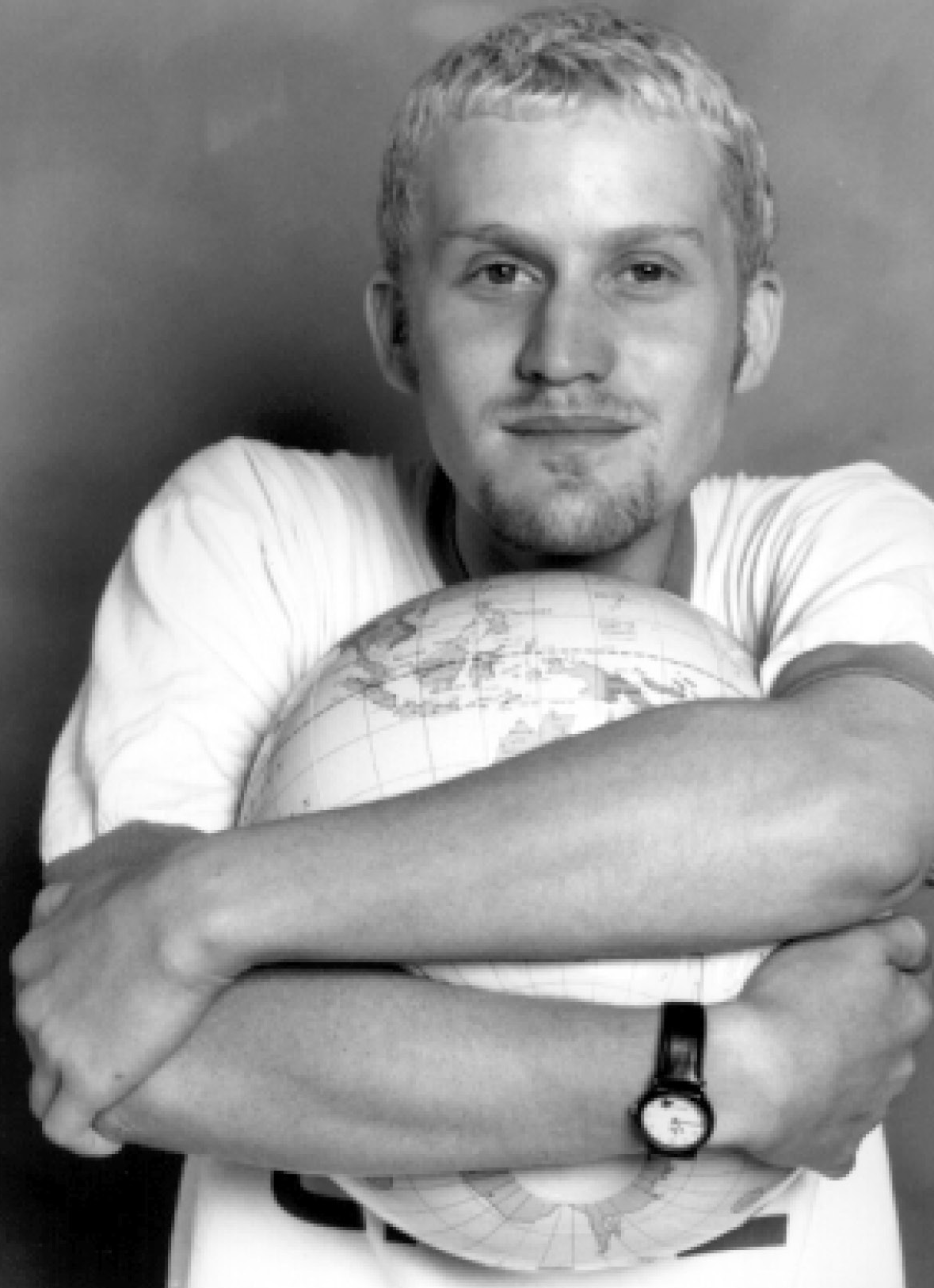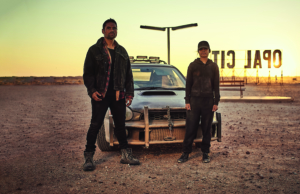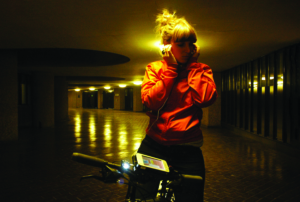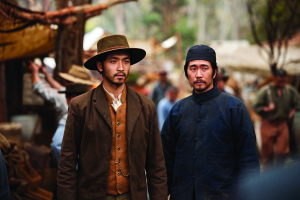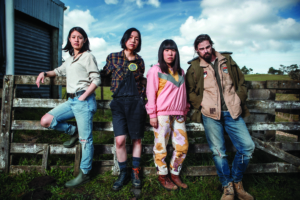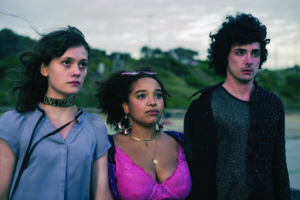Interview with John Safran
This interview with John Safran was first broadcast on ARTSalive in the week commencing 23 November 1997.
Was Race Around the World the ultimate working holiday, or one huge logistical nightmare?
Utter hell! It was fun, but not in the conventional sense of fun.
What was your ultimate goal in all this? To make people think or to make yourself into a personality?
Personality, like Con the Fruiterer? No, not at all. As I left I just had the vaguest notion of not wanting to do some ABC sentimental kind of ‘worthy’ documentary. I knew what I didn’t want to do, but I didn’t know what I did want to do. Only now can you look back on things. A lot of people talk to you and communicate their feelings about your documentaries as if there was some kind of master plan, or like you’re terribly clever or something like that. But everything that happened for me was pretty organic, of just kind of thinking up something at the moment and just doing it.
When you say ‘thinking it and then doing it’, do you think that should be the role of the documentary filmmaker – in front of the camera rather than behind it?
No, because I don’t think that because I did it my way and other people do it different ways that other people are necessarily wrong. What I did do in my head before I left was to build up a total stereotype of an ABC viewer, who would encompass things like political correctness, and who I was trying to irk or annoy.
I think you also succeeded in ‘irking’ some of the judges.
Yes, I did irk a few of the judges, but I cannot explain to people enough how much that genuinely doesn’t affect me.
There has been some criticism of the judges.
Oh yes, there’s been lots. I think the reason I’m more calm about the judging is that for people watching the show, the judges were the only reaction to the documentaries they saw, whereas I got a whole range of other reactions, from e-mails to the ABC to people talking to me on trams.
I had David Caesar bagging me, but other people were coming up and almost explaining to me what I did. It was really flattering, but I didn’t go out there to start preaching about my views on religion, for example.
It was relatively obvious you weren’t a good Jewish boy.
Yes, but I think I could have just got off the hook for nearly every doco I did, especially the religious ones, if I had preceding it with: ‘The church for thousands of years has been this oppressive organisation that has really stifled women,’ and done all that stuff and then said, ‘So therefore I’m doing this.’ Then everyone would have said, ‘Oh, what a nice little good ABC p.c. boy he is.’ But I just think that would have been too obvious.
Do you think people got the point?
I don’t know. People who come up and talk to me have.
You were overseas and sending back rough edit sheets. Were you pissed off you couldn’t have the final say?
No, not like the other racers were. Basically saying I’m a crap filmmaker, I can’t hold a camera still, and editing is not really going to help me any more. Everything I filmed was visually quite conventional and quite simple to cut together, as opposed to how Daniel and Olivia did things. I kind of understand them. At first I just thought they were a pack of whiny prima donnas, and it’s like, ‘Oh, for Christ’s sake! I can’t believe it, you’re doing everything: you’re directing it, you’re producing it, you’re presenting it, you’re filming it, but somehow the one thing that’s making your documentary crap is the fact that the only other contribution one person is making is screwing it all up.’ I just didn’t buy it. But there was one doco where I did actually try to put a bit of style into the edit and they kind of screwed that up a bit.
You seemed to take the piss out of all your subjects. Do you think that kind of role is justified?
If I had of gone to a bunch of American soldiers on some kind of military base in another country and I asked them all a lot of smart-arsed questions and they didn’t quite get me and they answered stupidly, then everyone would’ve gone ‘chuckle, chuckle, chuckle,’ and given me a pat on the back because I’d have shown them how dumb Americans are. Yet you do exactly the same to any other culture besides America, critique them in some way, and suddenly you’re a bigot or you’re culturally insensitive.
But these people are still your subjects. How do you think they would feel if they knew how they came out looking?
Well, I put it back to you, if you had gone to the deep South and there was, say, an Elvis church, and would’ve done the documentaries in my style, no one would have complained.
Do you think that makes it right though?
I might have done things that you can question the ethics of, but I will only accept that criticism if you analyse and critique what the other seven racers did as much as I was analysed and critiqued for my ethics. And what I mean by that is that the perceived morality of a documentary is often determined by the slickness of the filming. So much stuff is set up in documentaries and so many people are manipulated and used be-cause they’re seen by documentary makers as being certain sorts of people who conform to a story the makers want to tell. So to isolate me on one particular point is a really shallow reading.It’s almost like saying Ray Martin is nice because he helps build houses for handicapped kids, and Stuart Littlemore is nasty because he’s always really bitter and saying bad things about people. I got baptised on the Ivory Coast by black Protestants in a big muddy lake and did it in a not serious fashion. So?
Okay, I’m going to have to ask you what was your parents’ reaction?
I rang them up a week beforehand and they were just more worried about me coming home alive than whether I had converted.
Would you call yourself an atheist?
No, kind of an experimental agnostic, although I find it odd because I really just think I’m one of the few people who’s had the privilege of being on television and expressed any interest in theology these days. Most people don’t give a shit about religion, and I’m kind of just experimenting and trying to figure it out. If you just read about religion, and I mean like going deeper than watching Ray Martin’s Christmas Carols, it’s just amazing. The angel Gabriel talking to Mohammed in a cave, and this guy locked inside a whale. I feel like what I was doing was a logical reaction, and so often people try to make out you’re mad.
For example, I was on The Midday Show and Kerri-Anne Kennerley was doing all these asides to the camera and going, ‘Oh, what planet is he from?’ But the whole show is an artificially-created situation, it’s not real life and all these people are putting on all these fake emotions and acting bizarre. A friend had said I was the only sane person on The Midday Show and I agree with that. I don’t think I’m mad.
Earlier in the series you did a profile on an anarchist in London. It seemed like you were taking the piss out of someone from a marginal political group, therefore reinforcing stereotypes of that political group. How do you feel about that?
I absolutely promise you, and you’re just going to have to believe me, that was not my intention. The mainstream has a view of anarchists as being young bomb-throwers, but isn’t it odd and interesting that here’s a guy from a totally different age group and he still has these thoughts of anarchy? I can relate to him much better than some mohawked university student. Maybe people who are so moral and so worried about my lack of ethics should be asking how the hell do I know about class war or political movements. How do I know about dissident Palestinian writers if I haven’t had the sensitivity to read about them in the first place? People take what I’ve done on the most superficial level – ‘He streaked across Jerusalem and isn’t that a great Aussie kind of thing to do.’
Just for those who didn’t get it, what was the point of that documentary where you painted yourself in St Kilda colours and ran though the streets of Jerusalem stark naked?
At the time I just did it for the fuck of it. But in retrospectI’d say that we have these myths in society, especially in regard to religion, and I took a myth that I’d grown up with in Melbourne, that St Kilda won the 1966 Grand Final because it fell on the same day as the holiest day in the Jewish calendar, Yom Kippur. There were lots of Jews in the synagogue praying that day, and therefore the St Kilda Football club, which is heavily popular amongst the Jewish community, won. So I took that myth and I put it to the test: if I go around Israel, do the religious thing and pray to God that St Kilda’s going to win, will he listen to me? I don’t even follow the St Kilda Football Club.
Really? I thought you were a fan.
People come up and they’re so impressed and I don’t knowhow to break it to them. I’ve received letters from the AFL explaining that they have a luncheon to open Season ’98 and they’re wanting to play my doco there with footballers. That’s cool I guess. I’d prefer for someone else to chuck meaning into the docos because, as I say, although I’m not making literal points, they’re more vague things in them about myths and theology, and about love I guess.
The ‘love’ thing is the now famous documentary where you put a voodoo curse on your ex-girlfriend. How are you going to feel if something does happen to her?
I was at a party in Sydney where a girl, she had very spiritual eyes, just walked up to me out of the blue and said,‘Don’t fuck with voodoo,’ and it was really freaky. It just freaked me out because I’d had a few drinks by this time.But it’s impossible to know where to draw the line of how far you should respect other people’s cultures, because there’s no way you’re going to convince me that people out there respect everything equally. I think everyone has their list of the things they respect and don’t respect. I’m operating on your level of morality, but I’ve just changed the cast members.
Another example would be this bullshit Labor/Liberal division, but look at East Timor. I find it bizarre, especially hanging around the ABC with all these ‘champagne socialists’ whining about the good old days of the Labor party, but they’ve been just as ambivalent and dismissive as the Liberal party on East Timor. So fine, make these myths in your head about how one side’s moral and the other side’s immoral, but I don’t believe it. I just don’t believe that because I’m immoral in a more open way or in a different way, that it somehow makes me worse than people who are immoral but kind of hide it better.
